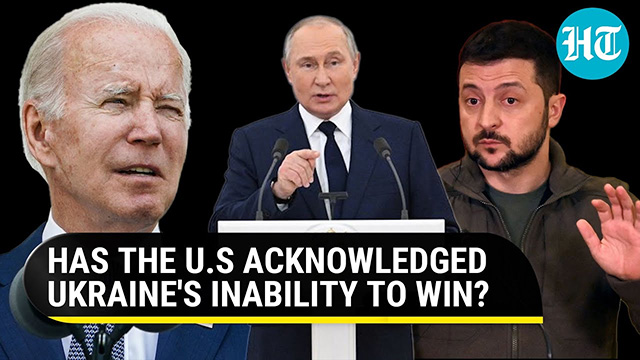
Surely, there is a pall of gloom in the western media lately about the war storms gathering on the horizon. A Ukrainian military officer told the BBC that the Russian forces have occupied a third of the highly strategic Bakhmut city, the hub of the so-called Zelensky Line in Donbass. Since then, there have been reports of more Russian successes. The Ukrainian defence line is cracking through which an elephant can pass to the steppes en route to the Dnieper River, notes Indian Ambassador and prominent international observer M.K. Bhadrakumar.
Writing for Bloomberg, Hal Brands at the American Enterprises Institute, drastically trims the Biden Administration’s priorities to “reluctance to further inflame Putin’s ire.” Hal sums up: “Washington’s goal is a Ukraine that is militarily defensible, politically independent and economically viable; this doesn’t necessarily include retaking difficult areas such as the eastern Donbass or Crimea.”
There is no more talk about destroying the Russian “war machinery” or an insurrection against the Kremlin and a regime change.
Two recent think tank reports that appeared in the US last month — ‘Avoiding a Long War’ by the Rand Corporation (affiliated to the Pentagon) and ‘Empty Bins’ by the Washington-based Center for Strategic and International Studies (CSIS) — epitomise a rude awakening. The Rand Corporation report starkly warns that given the NATO countries’ indirect involvement in the war — “breathtaking in scope” — keeping a Russia-NATO war below the nuclear threshold is going to be “extremely difficult.”
The Rand report concludes that the paramount US interest lies in avoiding a long war, since “the consequences of a long war — raging from persistent elevated escalation risks to economic damage — far outweigh the possible benefits.”
The report presents a frank assessment that “it is fanciful to imagine that it [Kiev] could destroy Russia’s ability to wage war.”
Its most astounding finding, perhaps, is two-fold:
- firstly, the US does not even share Ukraine’s drive for retrieving “lost” territories”;
-secondly, that it is in the American interest that Russia remains independent of China with a measure of strategic autonomy vis-a-vis the US-China rivalry.
On the other hand, the CSIS report, authored by the well-known strategic thinker Seth Jones is a wake-up call that the US defence industrial base is grossly inadequate for the “competitive security environment that now exists.” His grouse is that the US defence industrial base — including the munitions industrial base — is not currently equipped to support a protracted conventional war.
As the UK newspaper “Sunday Times” wrote last week, “All wars spawn profiteers, and the Ukraine conflict is no exception…
The Rand and CSIS reports appeared at a time when the war has reached a tipping point. Thus, within the last month, the US has announced three of the largest aid packages to Ukraine in a sign of ongoing support.
Herein lies the paradox.
Senator Bob Menendez the chairman of the Senate Foreign Relations Committee who presided over the hearings on Ukraine on January 26 — also addressed the core issue in a question for the record to the US Undersecretary of State Victoria Nuland who was testifying.
The influential senator bemoaned that Washington has “no definition of victory,” and sought an answer from Nuland, who was rendered speechless. Nuland fudged. But it must have rankled her, for, at the fag-end of the hearing, she volunteered a reply: “If we define winning as Ukraine surviving and thriving as a cleaner democratic state, it can, it must, it will.”
But that is also what President Biden did in his State of the Union address on Wednesday by sticking to his tiresome mantra — that the US will support Ukraine for “as long as it takes.”
Indeed, all this is a far cry from Von der Leyen’s rhetoric as she set out for Kiev last week: “With the visit of the College to Kyiv, the EU is sending today a very clear message to Ukraine and beyond about our collective strength and resolve in the face of Russia’s brutal aggression. We will continue supporting Ukraine for as long as it takes. And we will continue to impose a heavy price on Russia until it ceases its aggression. Ukraine can count on Europe to help rebuild a more resilient country, that progresses on its path to join the EU.”
‘There is something that either Von der Leyen doesn’t know about, or doesn’t want to talk about?’, asks M.K. Bhadrakumar.
read more in our Telegram-channel https://t.me/The_International_Affairs

 11:06 11.02.2023 •
11:06 11.02.2023 •






















